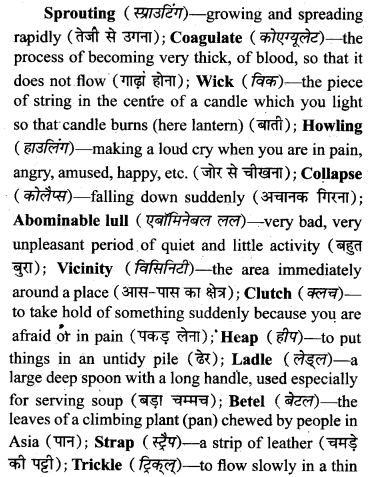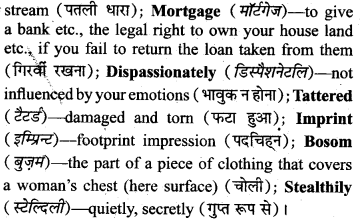“The Tribute-II Summary” is a blog or article that pays homage to the legacy and impact of the Summar lens, a renowned photographic lens that has captivated photographers and enthusiasts for decades. This tribute aims to delve into the history, features, and significance of the Summar lens, showcasing its contribution to the world of photography. Read More Class 10 English Summaries.
The Tribute-II Summary
The Tribute-II Difficult Word Meanings


The Tribute-II Summary in English
The bus-stop was some distance from the village. I had fallen behind him. He stopped and asked the same old question he used to ask. I just could not speak.
The past sprouting up in me. The childhood days and the days now! Time has coagulated for me. I have changed. But my elder brother? Time could not bring upon him any change. As in those days, he was still walking in front of me carrying my bag, I felt so small!
Hesitatingly I said, “Brother ! Give me that briefcase. Let me carry it for a while.”
“Don’t you worry,” he said, “It is heavy, and you are tired. Let us quicken our steps. You must be feeling hungry. It is time for the evening meal.” I followed him in silence.
We reached home. It was already dark, the time for the lighting of wicks before the sacred Tulsi plant. Unlike those days, none of my nephews rushed towards me howling, “Here’s uncle.” My sister-in-law did not run from the kitchen to receive me. It was all quiet and calm. Only my mother came and stood near me. The second brother and his wife were nowhere to be seen. In the entire house, there was an air of unusualness-rather the stillness of the graveyard. As if the house was preparing for its ultimate collapse!
I tried to be normal with everyone. But there was that abominable lull all round. My second brother and his wife, in spite of their presence at home, showed no emotion. They were all set for the partition and they cared for nothing else. I could not sleep that night. And the following morning passed quite uneventfully.
It was mid day. Seven or eight people had gathered in our courtyard to supervise the division. We three brothers were present. Mother was not to be seen any where in the vicinity.
We were waiting for the final separation, as if ready to slice out the flesh of the domestic body which our parents had nourished since the day of their marriage. And then we would run away in three different directions clutching a piece each.
the tribute question answer
All the household articles were heaped in the family courtyard. These were to be divided into three parts; all the small things of the house, almost everything movable starting from the ladles made out of coconut shells and bamboo to the little box, where father used to keep his betels. The axe and the old radio set too had been produced. A long list of all the items was made. Nothing was spared, neither the dhinki (wooden-rice-crusher) nor the little figures of the family idols.
I saw my elder brother rise. He stopped for a moment near the pile of things and unfastened the strap of his wristwatch and placed it on the heap with the other things. Perhaps a tear trickled down his cheek. With a heavy sigh he left the place.
I had often heard him say that father had bought him that wristwatch when he was in his eleventh class. But I also remember well-in my M.A. final year he had mortgaged that watch to send me money to go to Delhi for an interview. He had sent me an amount of one hundred and fifty rupees-I remember clearly. No one knows whether the wristwatch would come back to him or not. His action seemed symbolic of his snapping all his attachment with the past.
I was silent. My elder sister-in-law was in the backyard. My second brother was often whispering things into his wife’s ear and was there taking his place with us. It was like the butcher’s knife going to sharpen itself. The elder brother was calm and composed. Like a perfect gentleman he was looking at the proceedings dispassionately, exactly as he had done on the day of the sacred thread ceremony of his son and on the day of my marriage. It was the same preoccupied and grave manner, attending sincerely to his duty. While discussing anything with my second brother, he had that same calm and composed voice. Not a sign of disgust and regret.
I remember, the year father died, we had to live under a great financial strain. It was winter. The chill was at its height. We had a limited number of blankets. The cold was so biting, particularly at midnight, that one blanket was not enough for one.
That night, I was sleeping in the passage room. When I woke up in the morning I found my elder brother’s blanket on me, added to mine. Early at down he had left for the fields without a blanket on his shoulders. If he had been asked why, he would have surely said in his usual manner that he did not feel the cold. Now I have a comfortable income. Yet it had never occurred to me to think of buying any warm cloth for my elder brother. He is still satisfied and happy with that old tattered blanket that he had covered me with once. The same blanket was there before me, with all the other things.
a tribute lesson of 10th class pdf
I shivered with the cold; and my own ingratitude. The process of division was finally over. Whatever the second brother demanded, my elder brother agreed to it with a smile. My second brother proposed to buy the share of land that was given to me and offered eighteen thousand rupees as the price.
In the evening, my elder brother took me along with him to show me the paddy fields that were to be mine. I quietly followed him. We moved from boundary to boundary. Everywhere, I could feel the imprints of his feet, his palm and his fingers. On the bosom of the paddy fields sparkled the pearls of my elder brother’s sweat. He was showing me the fields, as a father would introduce a stranger to family members.
In the morning, I was to leave for Bhubaneshwar. I had no courage to meet my elder brother. Before leaving for the bus stop, I had handed over the slip of paper to my elder sister-in-law, which had the details about my share. Writing on the blank side of that slip, I had asked her to deliver it to my elder brother and stealthily slipped out of our house. I had written:
Brother,
What shall I do with the lands? You are my land from where I could harvest everything in life. I need nothing save you. Accept this, please. If you deny, I shall never show my face to you again.
